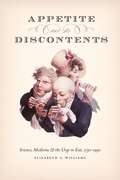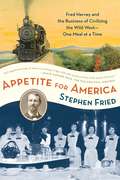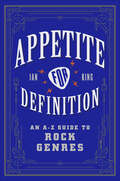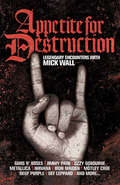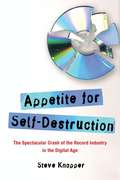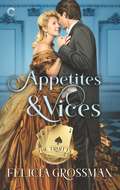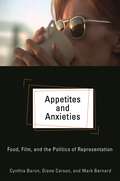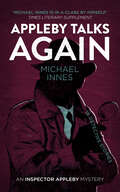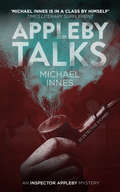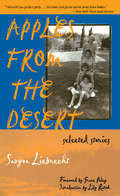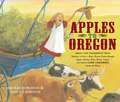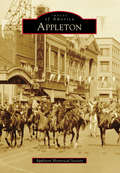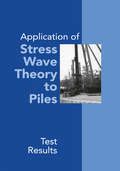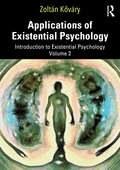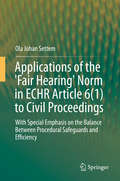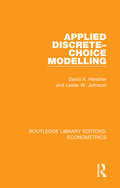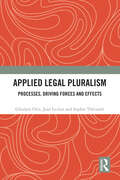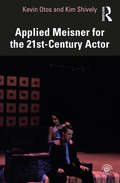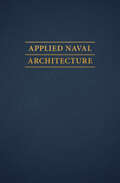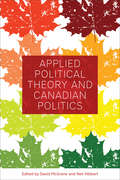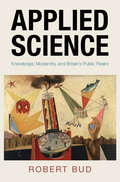- Table View
- List View
Appetite and Its Discontents: Science, Medicine, and the Urge to Eat, 1750-1950
by Elizabeth A. WilliamsWhy do we eat? Is it instinct? Despite the necessity of food, anxieties about what and how to eat are widespread and persistent. In Appetite and Its Discontents, Elizabeth A. Williams explores contemporary worries about eating through the lens of science and medicine to show us how appetite—once a matter of personal inclination—became an object of science. Williams charts the history of inquiry into appetite between 1750 and 1950, as scientific and medical concepts of appetite shifted alongside developments in physiology, natural history, psychology, and ethology. She shows how, in the eighteenth century, trust in appetite was undermined when researchers who investigated ingestion and digestion began claiming that science alone could say which ways of eating were healthy and which were not. She goes on to trace nineteenth- and twentieth-century conflicts over the nature of appetite between mechanists and vitalists, experimentalists and bedside physicians, and localists and holists, illuminating struggles that have never been resolved. By exploring the core disciplines in investigations in appetite and eating, Williams reframes the way we think about food, nutrition, and the nature of health itself..
Appetite and Its Discontents: Science, Medicine, and the Urge to Eat, 1750-1950
by Elizabeth A. WilliamsWhy do we eat? Is it instinct? Despite the necessity of food, anxieties about what and how to eat are widespread and persistent. In Appetite and Its Discontents, Elizabeth A. Williams explores contemporary worries about eating through the lens of science and medicine to show us how appetite—once a matter of personal inclination—became an object of science. Williams charts the history of inquiry into appetite between 1750 and 1950, as scientific and medical concepts of appetite shifted alongside developments in physiology, natural history, psychology, and ethology. She shows how, in the eighteenth century, trust in appetite was undermined when researchers who investigated ingestion and digestion began claiming that science alone could say which ways of eating were healthy and which were not. She goes on to trace nineteenth- and twentieth-century conflicts over the nature of appetite between mechanists and vitalists, experimentalists and bedside physicians, and localists and holists, illuminating struggles that have never been resolved. By exploring the core disciplines in investigations in appetite and eating, Williams reframes the way we think about food, nutrition, and the nature of health itself..
Appetite and Its Discontents: Science, Medicine, and the Urge to Eat, 1750-1950
by Elizabeth A. WilliamsWhy do we eat? Is it instinct? Despite the necessity of food, anxieties about what and how to eat are widespread and persistent. In Appetite and Its Discontents, Elizabeth A. Williams explores contemporary worries about eating through the lens of science and medicine to show us how appetite—once a matter of personal inclination—became an object of science. Williams charts the history of inquiry into appetite between 1750 and 1950, as scientific and medical concepts of appetite shifted alongside developments in physiology, natural history, psychology, and ethology. She shows how, in the eighteenth century, trust in appetite was undermined when researchers who investigated ingestion and digestion began claiming that science alone could say which ways of eating were healthy and which were not. She goes on to trace nineteenth- and twentieth-century conflicts over the nature of appetite between mechanists and vitalists, experimentalists and bedside physicians, and localists and holists, illuminating struggles that have never been resolved. By exploring the core disciplines in investigations in appetite and eating, Williams reframes the way we think about food, nutrition, and the nature of health itself..
Appetite for America: Fred Harvey and the Business of Civilizing the Wild West--One Meal at a Time
by Stephen FriedNEW YORK TIMES BESTSELLER * Featured in the PBS documentary The Harvey Girls: Opportunity BoundThe legendary life and entrepreneurial vision of Fred Harvey helped shape American culture and history for three generations--from the 1880s all the way through World War II--and still influence our lives today in surprising and fascinating ways. Now award-winning journalist Stephen Fried re-creates the life of this unlikely American hero, the founding father of the nation's service industry, whose remarkable family business civilized the West and introduced America to Americans.Appetite for America is the incredible real-life story of Fred Harvey--told in depth for the first time ever--as well as the story of this country's expansion into the Wild West of Bat Masterson and Billy the Kid, of the great days of the railroad, of a time when a deal could still be made with a handshake and the United States was still uniting. As a young immigrant, Fred Harvey worked his way up from dishwasher to household name: He was Ray Kroc before McDonald's, J. Willard Marriott before Marriott Hotels, Howard Schultz before Starbucks. His eating houses and hotels along the Atchison, Topeka, and Santa Fe railroad (including historic lodges still in use at the Grand Canyon) were patronized by princes, presidents, and countless ordinary travelers looking for the best cup of coffee in the country. Harvey's staff of carefully screened single young women--the celebrated Harvey Girls--were the country's first female workforce and became genuine Americana, even inspiring an MGM musical starring Judy Garland.With the verve and passion of Fred Harvey himself, Stephen Fried tells the story of how this visionary built his business from a single lunch counter into a family empire whose marketing and innovations we still encounter in myriad ways. Inspiring, instructive, and hugely entertaining, Appetite for America is historical biography that is as richly rewarding as a slice of fresh apple pie--and every bit as satisfying.*With two photo inserts featuring over 75 images, and an appendix with over fifty Fred Harvey recipes, most of them never-before-published.From the Hardcover edition.
Appetite for Definition: An A-Z Guide to Rock Genres
by Ian King“King brings an informative voice that will enlighten all fans of rock music in its many permutations. This encyclopedia of rock is sure to spark many heated conversations.” — Publishers Weekly“Recommended to all interested in the history of rock music, those looking for new music recommendations, and anyone who wants to improve their rock and roll vocabulary.” — Library Journal“Works as casual reading, a handy reference tool, inspiration for listeners stuck in a musical rut, and a welcome addition to library music collections.” — Booklist
Appetite for Destruction: The Mick Wall Interviews
by Mick WallWhether it's hanging around with Marillion's Fish in Berlin, seeing Whitesnake fail to ignite 1985's Rock in Rio, talking through old times with Jimmy Page in his Berkshire pile or following Ozzy Osbourne to Moscow, there isn't a rock luminary that Wall hasn't cross-examined or kept the flame burning with at some point over the last thirty years. Here, amongst several pieces, he catches Lars Ullrich just on the cusp of world domination; has dinner with Ritchie Blackmore on the eve of a Deep Purple comeback; and is up all night in LA with W. Axl Rose.APPETITE FOR DESTRUCTION gathers together Wall's journalism for Kerrang!, for whom he was the star writer in their eighties heyday. It also features brand-new introductions to all the pieces, written with maybe less hair but also the benefit of twenty years' hindsight.
Appetite for Destruction: The Mick Wall Interviews
by Mick Wall'APPETITE FOR DESTRUCTION has the best of Wall's Kerrang! features, each bolstered by new, insightful post-scripts. You won't read a funnier rock book****' MOJO'Wall is firing on all cylinders' CLASSIC ROCK'This hilarious tome is a collection of his finest moments... Wall had a great knack from getting under the skin of interviewees' BIG ISSUEWhether it's hanging around with Marillion's Fish in Berlin, seeing Whitesnake fail to ignite 1985's Rock in Rio, talking through old times with Jimmy Page in his Berkshire pile or following Ozzy Osbourne to Moscow, there isn't a rock luminary that Wall hasn't cross-examined or kept the flame burning with at some point over the last thirty years. Here, amongst several pieces, he catches Lars Ullrich just on the cusp of world domination; has dinner with Ritchie Blackmore on the eve of a Deep Purple comeback; and is up all night in LA with W. Axl Rose.APPETITE FOR DESTRUCTION gathers together Wall's journalism for Kerrang!, for whom he was the star writer in their eighties heyday. It also features brand-new introductions to all the pieces, written with maybe less hair but also the benefit of twenty years' hindsight.
Appetite for Self-Destruction: The Spectacular Crash of the Record Industry in the Digital Age
by Steve KnopperFor the first time, Appetite for Self-Destruction recounts the epic story of the precipitous rise and fall of the recording industry over the past three decades, when the incredible success of the CD turned the music business into one of the most glamorous, high-profile industries in the world -- and the advent of file sharing brought it to its knees. In a comprehensive, fast-paced account full of larger-than-life personalities, Rolling Stone contributing editor Steve Knopper shows that, after the incredible wealth and excess of the '80s and '90s, Sony, Warner, and the other big players brought about their own downfall through years of denial and bad decisions in the face of dramatic advances in technology.
Appetites & Vices (The Truitts #1)
by Felicia GrossmanHe’s her ticket into high society…Banking heiress Ursula Nunes has lived her life on the fringes of Philadelphia’s upper class. Her Jewish heritage means she’s never quite been welcomed by society’s elite…and her quick temper has never helped, either. A faux engagement to the scion of the mid-Atlantic’s most storied family might work to repair her rumpled reputation and gain her entrée to the life she thinks she wants…if she can ignore the way her “betrothed” makes her feel warm all over and stay focused on her goal. She’s his ticket out…Former libertine John Thaddeus “Jay” Truitt is hardly the man to teach innocent women about propriety. Luckily, high society has little to do with being proper and everything to do with identifying your foe’s temptation—an art form Jay mastered long ago. A broken engagement will give him the perfect excuse to run off to Europe and a life of indulgence. But when the game turns too personal, all bets are off…One-click with confidence. This title is part of the Carina Press Romance Promise: all the romance you’re looking for with an HEA/HFN. It’s a promise!Publisher’s Note: Appetites & Vices deals with topics some readers may find difficult, including substance abuse and mental illness.
Appetites and Anxieties: Food, Film, and the Politics of Representation
by Cynthia Baron Diane Carson Mark BernardCinema is a mosaic of memorable food scenes. Detectives drink alone. Gangsters talk with their mouths full. Families around the world argue at dinner. Food documentaries challenge popular consumption-centered visions. In Appetites and Anxieties: Food, Film, and the Politics of Representation, authors Cynthia Baron, Diane Carson, and Mark Bernard use a foodways paradigm, drawn from the fields of folklore and cultural anthropology, to illuminate film's cultural and material politics. In looking at how films do and do not represent food procurement, preparation, presentation, consumption, clean-up, and disposal, the authors bring the pleasures, dangers, and implications of consumption to center stage. In nine chapters, Baron, Carson, and Bernard consider food in fiction films and documentaries-from both American and international cinema. The first chapter examines film practice from the foodways perspective, supplying a foundation for the collection of case studies that follow. Chapter 2 takes a political economy approach as it examines the food industry and the film industry's policies that determine representations of food in film. In chapter 3, the authors explore food and food interactions as a means for creating community in Bagdad Café, while in chapter 4 they take a close look at 301/302, in which food is used to mount social critique. Chapter 5 focuses on cannibal films, showing how the foodways paradigm unlocks the implications of films that dramatize one of society's greatest food taboos. In chapter 6, the authors demonstrate ways that insights generated by the foodways lens can enrich genre and auteur studies. Chapter 7 considers documentaries about food and water resources, while chapter 8 examines food documentaries that slip through the cracks of film censorship by going into exhibition without an MPAA rating. Finally, in chapter 9, the authors study films from several national cinemas to explore the intersection of food, gender, and ethnicity. Four appendices provide insights from a food stylist, a selected filmography of fiction films and a filmography of documentaries that feature foodways components, and a list of selected works in food and cultural studies.
Appleby Talks Again (The Inspector Appleby Mysteries)
by Michael InnesFrom a British mystery author “in a class by himself among detective story writers,” eighteen classic crime stories, perfect for astute armchair detectives (The Times Literary Supplement).Scandal is at stake for London’s fashionable society when Edwardian playwright Richard Dangerfield’s sordid diary falls into the hands of a blackmailer. Though Dangerfield is long dead, those who consorted with him are all very much alive and at the respectable old age where they’d hoped such stories would follow them to their graves. Fortunately, Scotland Yard’s most brilliant inspector is on the case. Sir John Appleby wittily reveals his intellectual prowess in solving this crime, as well as seventeen other puzzling mysteries in this stimulating collection of short stories. From acclaimed Scottish author Michael Innes, Appleby Talks Again is a must-read for fans of classic crime fiction.Praise for Michael Innes and the Inspector Appleby series“Wickedly witty.” —Daily Mail“As farfetched and literary as Sayers” —The Cambridge Companion to Crime Fiction
Appleby Talks: 23 Detective Stories (The Inspector Appleby Mysteries)
by Michael InnesFrom a British crime author “in a class by himself among detective story writers,” twenty-three short mysteries featuring the brilliant Inspector Appleby (The Times Literary Supplement).It appears Inspector Appleby is ready to tell all in this must-read collection of twenty-three short stories from acclaimed Scottish mystery author Michael Innes. One of the most discerning detectives of Golden Age fiction, Appleby sits down with pipe in hand to spin tales from the jewel heist he foiled as a precocious teen to the myriad of fascinating cases brought before him as one of the most respected detectives of Scotland Yard. There’s the account of Arbuthnot, a novelist who becomes part of a sordid tale himself when his crazy wife’s lover is found dead on his living room floor. Or the case of the murdered anatomy professor discovered in place of the missing cadaver in his lesson plan. Also included is the not-to-be-missed fair play mystery “Dead Man’s Shoes,” a puzzle only Inspector Appleby—and his most astute readers—can solve. So pull up a pub chair and a pint, or a blanket and a pot of tea, and join crime fiction’s dazzlingly smart detective as he wittily discloses his investigative prowess during his intriguing, often absurd, but always entertaining career as one of Scotland Yard’s best.Praise for Michael Innes and the Inspector Appleby series“Wickedly witty.” —Daily Mail“As farfetched and literary as Sayers” —The Cambridge Companion to Crime Fiction
Applegate Landing
by Jean ConradGloriana Windemere arrives in Oregon Territory, expecting to face a trackless wilderness and hostile Indians. Instead, she discovers thriving settlements like Applegate Landing and a hostile frontiersman, Graham Norton. Gloriana finds herself clashing with Graham, but making friends with the Klamath Indians and a charming, though mysterious young army lieutenant, John Tilton. Meanwhile, unprotected settlers are being ambushed and slaughtered, with the massacres being blamed on a band of renegade Klamaths. Not until the Klamath Mission itself is under attack does Gloriana learn the identity of the real renegades. The only hope of survival is to find the man she has grown to love, who is working somewhere in the rugged lava mines of the new territory
Apples from the Desert
by Grace Paley Savyon LiebrechtSavyon Liebrecht's intense, lyrical, and emotionally complex stories have made her a best-selling writer in her native Israel. Her short fiction explores the everyday tragedies that emanate from strained relationships between Arabs and Jews, women and men, older and younger generations in present-day Israel. According to the Washington Post Book World, her "engrossing and skillful tales take you through the lives of real people, to the heart of their emotional and moral being." Liebrecht reveals the impact of larger social and political conflicts within the private world of the home with a precision and a subtle ferocity reminiscent of the work of Nadine Gordimer. "These finely wrought stories of private lives shed light on a terrifying political conflict", notes the New York Times Book Review. "[Liebrecht] takes you places you've never been before." The Helen Rose Scheuer Jewish Woman's Series
Apples to Oregon: Being the (Slightly) True Narrative of How a Brave Pioneer Father Brought Apples, Peaches, Pears, Plums, Grapes, and Cherries (and Children) Across the Plains
by Deborah HopkinsonWhen Papa decides to pull up roots and move from Iowa to Oregon, he can't bear to leave his precious apple trees behind. Or his peaches, plums, grapes, cherries, and pears. Oh, and he takes his family along too. But the trail is cruel-first there's a river to cross that's wider than Texas...and then there are hailstones as big as plums...and there's even a drought, sure to crisp the cherries. Those poor pippins! Luckily Delicious (the nonedible apple of Daddy's eye) is strong-as young 'uns raised on apples are-and won't let anything stop her father's darling saps from tasting the sweet Oregon soil.
Appleton
by Appleton Historical SocietyAppleton's rich beginnings found their source at Lawrence Institute, the university in the woods, on the Fox River. Rev. Henry Colman and Rev. William Sampson chose the bluff on the river for the site of the institute. Amos A. Lawrence donated $10,000, and the building began in July 1848. It was with axe and hook that the first settlers cleared the land for Lawrence and Appleton. The city was made up of three villages: Martin (Grand Chute), Appleton, and Lawesburg. In 1857, the villages joined together to form the city of Appleton. Amos Story was the city's first mayor. Appleton's industry grew on the banks of the Fox River, including hydroelectricity and paper.
Application of Stress Wave Theory to Piles: Proceedings of the 14th International Conference on the Application of Stress-Wave Theory to Piles, The Hague, Netherlands, 21-24 September 1992
by Frans B.J. BarendsThis volume presents the Pile Testing Research Project, and covers most of the results. Topics include: general soil conditions of the test site; pile integrity tests; pile driving prediction contest; pile driving demonstration; and vibratory pile driving techniques.
Applications of Existential Psychology: Introduction to Existential Psychology Volume 2
by Zoltán KőváryThe second in a two-part set, this volume offers a detailed examination of the application of existential psychology.This book begins by looking at the "conditio humana" – the most important topics of existential psychology, including anxiety, freedom, choices, authenticity, suffering and meaning, creativity, togetherness, time and death. It then moves through the practical application of existential psychology in the context of dreams, research, pathology and therapy. Examining key theories, models and research, the volume offers a fascinating overview of how the disciplines of art, philosophy, literature, science and theology contribute to a deeper understanding of personal self-knowledge and a person’s sense of purpose. This unique transdisciplinary approach demonstrates how readers can apply philosophical, historical and artistic aspects of existential psychology to their lives. The book concludes by considering the role of existential psychology in the present.Going beyond the questions of therapy and counselling that typically make up the study of existential psychology, the book offers the ultimate introduction for students and scholars of this fascinating and deeply rooted discipline. It may also interest professionals working in related fields.
Applications of the 'Fair Hearing' Norm in ECHR Article 6(1) to Civil Proceedings: With Special Emphasis on the Balance Between Procedural Safeguards and Efficiency
by Ola Johan SettemThis book focuses on the most important implications of the "fair hearing" right for conducting civil proceedings. It provides a thorough and critical analysis of the case law of the European Court of Human Rights (the Strasbourg Court) regarding Article 6 of the European Convention on Human Rights. It puts forward a generally applicable framework for the analysis of the various procedural issues to which the "fair hearing" right may give rise, then applies that framework to discuss a selection of specific procedural issues. The book investigates several important questions of general scope in the context of ECHR Article 6, such as: What is the relevance of case law regarding criminal proceedings when the "fair hearing" right is applied to civil proceedings? How does the Strasbourg Court actually proceed when evaluating whether specific court proceedings have been "fair"? What are the roles of fundamental concepts such as the "margin of appreciation" and proportionality in this regard? In the subsequent discussion of specific procedural issues, the focus is on the balance that must be struck between procedural safeguards and the objectives of efficiency and economy. The book considers specific procedural issues such as: When must an oral hearing be held in order for civil proceedings to be "fair"? When will a refusal of specific evidence render civil proceedings unfair? When is a civil litigant entitled to le gal aid? As such, the book not only presents current case law; it also compares various strands of the case law regarding the "fair hearing" right, and argues that the Strasbourg Court's approach to various pertinent issues needs to become more consistent. Offering an in-depth examination of the Strasbourg Court's case law regarding ECHR Article 6, this book should be consulted by anyone interested in fundamental fair trial rights.
Applied Discrete-Choice Modelling (Routledge Library Editions: Econometrics)
by David A. Hensher Lester W. JohnsonOriginally published in 1981. Discrete-choice modelling is an area of econometrics where significant advances have been made at the research level. This book presents an overview of these advances, explaining the theory underlying the model, and explores its various applications. It shows how operational choice models can be used, and how they are particularly useful for a better understanding of consumer demand theory. It discusses particular problems connected with the model and its use, and reports on the authors’ own empirical research. This is a comprehensive survey of research developments in discrete choice modelling and its applications.
Applied Legal Pluralism: Processes, Driving Forces and Effects
by Sophie Thériault Ghislain Otis Jean LeclairThis book offers a comparative study of the management of legal pluralism. The authors describe and analyse the way state and non-state legal systems acknowledge legal pluralism – defined as the coexistence of a state and non-state legal systems in the same space in respect of the same subject matter for the same population - and determine its consequences for their own purposes. The book sheds light on the management processes deployed by legal systems in Africa, Canada, Central Europe and the South Pacific, the multitudinous factors circumscribing the action of systems and individuals with respect to legal pluralism, and the effects of management strategies and processes on systems as well as on individuals. The book offers fresh practical and analytical insight on applied legal pluralism, a fast-growing field of scholarship and professional practice. Drawing from a wealth of original empirical data collected in several countries by a multilingual and multidisciplinary team, it provides a thorough account of the intricate patterns of state and non-state practices with respect to legal pluralism. As the book’s non-prescriptive approach helps to uncover and evaluate several biases or assumptions on the part of policy makers, scholars and development agencies regarding the nature and the consequences of legal pluralism, it will appeal to a wide range of scholars and practitioners in law, development studies, political science and social sciences.
Applied Meisner for the 21st-Century Actor
by Kevin Otos Kim ShivelyApplied Meisner for the 21st-Century Actor develops Meisner’s core principles for the contemporary actor and presents a Meisner-based acting technique that empowers practitioners to take ownership of their own creative process. In this book, the authors present the best, most applicable foundational components of Meisner’s technique in a clear, pragmatic, and ethical manner, and advance Meisner's core principles with their own innovations. Drawing on the best practices of consent-based work, they outline a specific approach to creating clear boundaries for the actor and establishing an ethical acting studio. Filled with practical exercises, useful definitions and explanations of foundational principles, and helpful advice on how to recognize and overcome common acting traps and pitfalls, this book provides a replicable and flexible technique that puts the actor at the center of their training. Applied Meisner for the 21st-Century Actor offers actors and students of acting courses a workable technique that will foster growth and discovery throughout their career. The text also includes links to the companion website www.21CActor.com, where readers can engage with the material covered in the book and with Otos’ and Shively’s most up-to-date research, supplemental materials, and training opportunities.
Applied Naval Architecture
by Robert B ZubalyApplied Naval Architecture is intended for undergraduate students of many of the disciplines in maritime affairs, including marine engineering, marine transportation, nautical science, shipbuilding or ship production (shipyard apprentice schools), marine electrical engineering, meteorology, and oceanography. It could be used as an introduction to naval architecture for technical personnel of all types already employed in shipyards, for licensed officers as a general reference, and preparation for license upgrading examinations. It describes in detail what naval architects do, and how they do it, to all students and practitioners involved in the business of merchant ships and shipping, except for professional naval architects themselves. Students preparing for a degree in naval architecture would find the book useful as an introduction to their profession.
Applied Political Theory and Canadian Politics
by David McGrane Neil HibbertBringing together political theorists and specialists in Canadian politics, Applied Political Theory and Canadian Politics combines conceptual frameworks from political theory and empirical evidence to offer fresh perspectives on political events in contemporary Canada. Examining complex and timely subjects such as equality, social justice, democracy, citizenship, and ethnic diversity, contributors present current and archival research supplemented with insights drawn from political theory to give readers a deep and nuanced understanding of increasingly pressing issues in Canadian society. For scholars and students seeking a work of political theory that is tangible, focused, and connected to the real world of everyday politics, Applied Political Theory and Canadian Politics will be an important resource, combining philosophical insights and empirical evidence to enhance our understanding of contemporary Canadian politics.
Applied Science: Knowledge, Modernity, and Britain's Public Realm (Science in History)
by Robert BudFor almost two centuries, the category of 'applied science' was widely taken to be both real and important. Then, its use faded. How could an entire category of science appear and disappear? By taking a longue durée approach to British attitudes across the nineteenth and twentieth centuries, Robert Bud explores the scientific and cultural trends that led to such a dramatic rise and fall. He traces the prospects and consequences that gave the term meaning, from its origins to its heyday as an elixir to cure many of the economic, cultural, and political ills of the UK, eventually overtaken by its competitor, 'technology'. Bud examines how 'applied science' was shaped by educational and research institutions, sociotechnical imaginaries, and political ideologies and explores the extent to which non-scientific lay opinion, mediated by politicians and newspapers, could become a driver in the classification of science.
